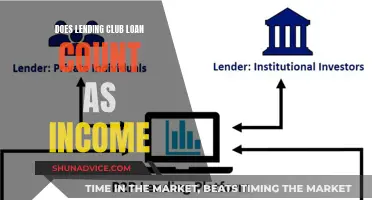
Lenders require income verification to ensure that you can afford to pay back the loan. The income verification process varies depending on the type of loan, the lender's policies, and how you earn your money. For example, mortgage lenders typically require more documentation than personal loan providers due to the higher loan amounts. While some lenders may not require income verification, especially for borrowers with excellent credit scores, it is still a crucial step in the loan approval process for most lenders.
| Characteristics | Values |
|---|---|
| Lenders require income verification | To ensure the borrower can afford the loan |
| Modern technology allows lenders to verify income | Electronically |
| Cash income can be proven | Through bank statements or tax returns |
| No-income verification loans exist | Yes, but they are risky and have high-interest rates |
| No-income verification loans are also known as | No-doc loans |
| No-doc loans are suitable for | Self-employed borrowers or real estate investors |
| No-doc loans require | Higher down payments and credit scores |
| Lenders will consider | Credit score and debt-to-income ratio for no-income verification loans |
| No-income verification loans can be received from lenders who check | Other aspects of the borrower's finances |
What You'll Learn

Lenders verify income to ensure you can afford the loan
Lenders require income verification to ensure that you can afford the loan. Before approving a loan, lenders want to make sure that you can pay them back. Your credit score informs them about your history of managing debt, but it does not tell them whether you can cover your current expenses and make the payments on the new loan. Therefore, lenders verify your income.
Lenders use your debt-to-income ratio (DTI) to analyse the relationship between your income and your debt. To calculate your DTI, they add up your monthly housing expenses and your required monthly debt payments (including the new loan you want) and divide that total by your gross (before-tax) monthly income. For higher loan amounts, you need to show more income.
The documents you need for income verification depend on how you earn your money, your lender's policies, and the type of loan. For example, in the case of mortgages, lenders require proof of income because it is mandated by law. This is called the ATR or Ability to Repay rule. Mortgage lenders generally require more income documentation than personal loan providers because mortgage loan amounts tend to be higher.
Lenders may verify your income electronically if you are a W-2 employee. They may also ask for your recent pay stubs, W-2 forms, or a signed Verification of Employment (VOE) form. Self-employed borrowers will need to provide a Schedule C form as proof of income. If you receive your income in cash, you should be able to prove it with bank statements or tax returns.
It is important to note that there are also no-income loans available, but they tend to have high-interest rates, short repayment periods, and the risk of falling into debt. These loans may be secured by your home or retirement savings account. However, failing to make payments on loans secured by your home can result in foreclosure.
Loan Counseling: Does It Really Make a Difference?
You may want to see also

Income verification is a requirement for mortgage loans
In the case of mortgages, income verification is legally required due to the Ability to Repay (ATR) rule, which was implemented to prevent home foreclosures. Mortgage lenders typically require more income documentation than personal loan providers as mortgage loan amounts tend to be higher. The income verification process can continue until the home loan is funded and the purchase is complete. Any changes in employment or income sources during this period could result in a full re-evaluation of the borrower's financials.
While traditional mortgage lenders require extensive income verification, there are alternative options available, such as no-income verification mortgages or low-documentation mortgages. These types of mortgages allow borrowers to qualify their income using alternative methods, such as bank statements or business profit and loss statements. No-income verification mortgages may be suitable for self-employed individuals, real estate investors, or high-net-worth individuals. However, these loans often come with higher down payments, higher interest rates, and higher credit score requirements.
It is important to note that income verification is just one aspect of the mortgage loan application process. Lenders will also consider the borrower's credit score, debt-to-income ratio (DTI), and other financial obligations to determine the loan amount and interest rate.
Lending Club Loan App: What You Need to Know
You may want to see also

No-income loans are available, but they are risky
Lenders typically verify income to ensure that the borrower has the ability to repay the loan. While no-income loans are available, they are often risky and come with high interest rates and short repayment periods.
No-income loans are personal loans that do not require proof of income from the borrower. These loans are usually taken by those who are unemployed, self-employed, or retired. Lenders of no-income loans do not require traditional income sources, such as pay stubs or W-2s, to be documented. Instead, they may rely on other measures to ensure they can recoup their investment, such as high-interest rates and additional fees.
No-income loans are risky for both the borrower and the lender. For the borrower, these loans often come with high-interest rates, short repayment periods, and the risk of falling into debt. They may also require collateral, such as a home equity loan, which can result in foreclosure if payments are missed. For the lender, the risk is that the borrower may not be able to repay the loan, which could result in financial loss for the lender.
There are several types of no-income loans available, including no-doc mortgages, stated-income loans, and NINJA loans. A no-doc mortgage, also known as a no-income verification mortgage, allows borrowers to obtain a home loan without providing proof of income. Stated-income loans are similar, as they do not require a W-2, Form 1099, bank statement, or other sources to verify the applicant's income. NINJA loans, which stand for "no-income, no-job, no-asset," do not require lenders to verify income, assets, or employment.
While no-income loans can be a useful option for those who do not qualify for traditional loans, it is important to carefully consider the risks and alternative options before taking out this type of loan. Safer alternatives to no-income loans include loans with a co-signer, HELOCs, and withdrawals from retirement accounts.
Loan Guarantees: Risky Business for Microfinance?
You may want to see also

Lenders may verify income electronically
Lenders may also use digital services to access an applicant's bank or payroll account, with the user's permission, to verify income. This can be a convenient and streamlined process, but it is important to consider the security risks of sharing login credentials with third-party aggregators. These aggregators may continue to have access to your data even after the loan application has been processed, so it is important to revoke their access afterward.
Some lenders may also accept digital pay stubs, W-2 forms, or tax returns as proof of income, which can be provided by the borrower without needing to contact the employer. This can speed up the verification process, especially if the employer is unable or unwilling to provide immediate verification.
Additionally, lenders may use statistical models to evaluate a borrower's loan application, identifying any conflicting or unusual information that may require additional confirmation. This can include random income verification for testing and analysis purposes.
It is worth noting that some loans, such as personal loans, may not require income verification. These no-income loans typically have higher interest rates and shorter repayment periods, and they are generally available to borrowers with high credit scores. However, it is always important to provide proof of some form of income source when applying for a loan.
State Laws and Loan Agreements: Who Follows Whom?
You may want to see also

Income verification may require extensive documentation
Income verification is a crucial step in the loan application process, as it helps lenders determine your ability to repay the loan. While some lenders may be able to verify your income electronically, others may require extensive documentation. The specific documents requested can vary depending on your employment status, income sources, and the lender's policies. Here are some common documents that may be required for income verification:
- Pay stubs: These are typically provided at the end of each pay period and can verify gross and net income, payment frequency, and fluctuations. Lenders often request pay stubs from the last two months or more to ensure they have an accurate and up-to-date understanding of your income.
- Wage and tax statements: Form W-2 or Form 1099 provides detailed information about your annual earnings, including wages and taxes. These forms are especially important for self-employed individuals, as they are legally recognized by the Internal Revenue Service.
- Tax returns: Tax returns, such as Form 1040, offer a comprehensive overview of all your income sources during the tax year. They can be helpful when your income is derived from multiple sources or if you have changed jobs recently.
- Severance statements: While these can be used as proof of income, they are typically one-time payments and may not be considered a reliable indicator of ongoing income.
- Social Security benefit letters: If you receive Social Security benefits, you can request a letter from the government to verify your monthly payments.
- Annuity statements: These statements detail the exact amount of income you receive and the payout schedule based on your agreement with an insurance company.
- Pension distribution statements: If you receive a pension as your primary source of income, Form 1099-R will show your yearly pension distribution.
- Bank statements: For those with non-traditional income sources, such as self-employed individuals or real estate investors, lenders may review several months of bank statements to assess financial stability.
It is important to note that the requirements for income verification may vary depending on the type of loan you are seeking. For example, mortgage lenders typically require more extensive income documentation than personal loan providers due to the higher loan amounts and the legal requirement to follow the Ability to Repay (ATR) rule. On the other hand, some loans, such as no-doc mortgages or no-income loans, do not require traditional income verification methods and may be more suitable for borrowers with non-traditional income sources. However, these alternative loan options often come with higher interest rates, shorter repayment periods, and a higher risk of falling into debt.
Lending Club: Can You Refinance Existing Loans?
You may want to see also
Frequently asked questions
Income verification is the process of checking whether a loan applicant can afford to pay back the loan. Lenders will require proof of income to ensure that the applicant can make the payments on the loan they want.
The documents required for income verification depend on how you earn your money, your lender's policies, and the type of loan. Typically, you may be asked to provide your pay stubs, W-2 forms, or other tax records. If you receive your income in cash, you can use bank statements or tax returns to prove it.
Yes, it is possible to obtain a loan without income verification, known as a no-income loan. However, these loans often have high-interest rates, short repayment periods, and a high risk of falling into debt. Lenders may require a high credit score to compensate for the lack of income verification.







